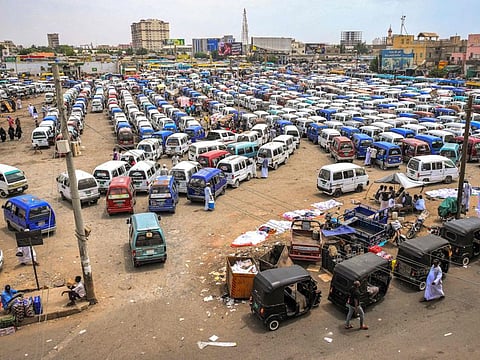Sudan ceasefire brings some respite after weeks of heavy battles
US,Saudi Arabia tracking the ceasefire;activists complain of severe rights abuses

KHARTOUM: Artillery fire could be heard in parts of Khartoum and warplanes flew overhead on Tuesday, residents said, though an internationally-monitored ceasefire appeared to have brought some respite from heavy fighting in the Sudanese capital.
Night-time airstrikes were reported in at least one area after the ceasefire started late on Monday, but residents otherwise reported relative calm.
Also Read: UAE welcomes ceasefire agreement in Sudan
The truce was agreed at talks in Jeddah on Saturday after five weeks of fierce battles between the army and the paramilitary Rapid Support Forces (RSF). It is being tracked by Saudi Arabia and the United States and is meant to allow for the delivery of humanitarian relief.
Sudanese activists wrote to the United Nations envoy to Sudan welcoming the ceasefire agreement but complaining of severe human rights abuses against civilians that they said took place as the fighting raged and should be investigated.
Neighbourhood committees that have been at the forefront of local aid efforts in the capital were preparing to receive supplies, though much of the aid that has arrived in Port Sudan on the Red Sea coast is yet to be distributed as agencies wait for security clearance, activists and aid workers said.
The ceasefire deal has raised hopes of a pause in a war that has driven nearly 1.1 million people from their homes, including more than 250,000 who have fled to neighbouring countries.
“Our only hope is that the truce succeeds, so that we can return to our normal life, feel safe, and go back to work again,” said Khartoum resident Atef Salah Al Deen, 42.
Although fighting has continued through previous ceasefires, this was the first to be formally agreed following negotiations.
The ceasefire deal includes for the first time a monitoring mechanism involving the army and RSF as well as representatives from Saudi Arabia and the United States, which brokered the agreement after talks in Jeddah.
US Secretary of State Antony Blinken said the monitoring mechanism would be “remote”, without giving details.
ACTIVISTS’ LETTER
“If the ceasefire is violated, we’ll know, and we will hold violators accountable through our sanctions and other tools at our disposal,” he said in a video message.
“The Jeddah talks have had a narrow focus. Ending violence and bringing assistance to the Sudanese people. A permanent resolution of this conflict will require much more,” he added.
Shortly before the ceasefire was due to take effect, the RSF released an audio message from its commander Mohammad Hamdan Dagalo, known as Hemedti, in which he thanked Saudi Arabia and the US but urged his men on to victory.
Red Cross warns of possible humanitarian disaster
Sudanese refugees are streaming into Chad so quickly that it will be impossible to relocate them all to safer places before the start of the rainy season in late June, a senior Red Cross official said on Tuesday, flagging the risk of a disaster. Some 60,000-90,000 people have fled into neighbouring Chad since violence erupted last month, the UN refugee agency said this week. Tens of thousands have converged in a makeshift camp in a village named Borota where Pierre Kremer of the International Federation of the Red Cross and Red Crescent Societies (IFRC) was based last week. “We know that we won’t be able to relocate all of them before the rainy season,” Kremer told a Geneva press briefing via video link from Nairobi. “It’s a bit of a race now to relocate as many as we can... We run the risk of a major humanitarian disaster in this area.” Access to the area is expected to be difficult after the rainy season starts because large streams, known as wadis, are set to cut it off from supplies. Some 80% of those arriving are women and children, many of whom have been separated from their parents as they fled from Darfur where violence between warring factions in the capital has spread in recent weeks. Kremer said there had been reports of snake and scorpion bites among the refugees who are sleeping on the ground. The UN refugee agency (UNHCR) has said it is seeking to move refugees gathering in border areas to pre-existing refugee camps in Chad and establish five new ones. A UNHCR spokesperson in Chad, Eujin Byun, told Reuters that many of the refugees reported losing family members and having their homes burned down. Teenagers were often travelling alone with infants, she said. “I’m overwhelmed to see them,” she said. “It’s a lot of children and it’s really heartbreaking as they don’t know where their parents are.”
“We will not retreat until we end this coup,” he said.
Both sides accused each other of an attempted power grab at the start of the conflict on April 15.
The United Nations envoy to Sudan warned on Monday of the increasing “ethnicisation” of the military conflict.
“The growing ethnicisation of the conflict risks to expand and prolong it, with implications for the region,” Volker Perthes told a briefing at the UN Security Council.
Sudanese activists have written a letter to Perthes complaining of indiscriminate shelling and airstrikes against residential areas as well as the taking of civilians as human shields, extrajudicial killings, torture and sexual violence.
The crisis is putting pressure on Sudan’s neighbours. Sudanese refugees are streaming into Chad so quickly that it will be impossible to relocate them all to safer places before the start of the rainy season in late June, a senior Red Cross official said on Tuesday, flagging the risk of a disaster.
Some 60,000-90,000 people have fled into neighbouring Chad, the UN refugee agency said this week.



